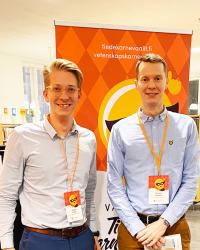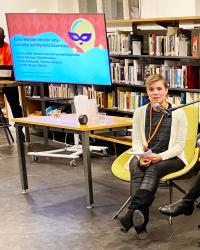Hanken researcher Maria Ehrnström-Fuentes: It takes courage to jump off the growth train

Ehrnström-Fuente's research stems from her own dissatisfaction with how issues of sustainability are limited to carbon dioxide emissions measurements and the current economic structures based on continued economic growth and globalisation.
In her research, she has interviewed people who have “jumped off the growth train” and now lead a more sustainable life. Magdalena Lindroos, Kaj Löfvik and Maria Österåker participated in the panel discussion, all of whom resigned to create a life that follows the rhythms of nature.
Maria Österåker is an economist herself and the idea of making money has previously been very central to her.
- I no longer feel involved in the economy, but in a good way. I do not need money, working life or my material needs no longer control me.
More time left to live
Time is a common factor that all participants mention as a reason to reduce their activity in working life. They feel that they want to gain time for something other than being at work. You cherish the moment and the need for consumption decreases.
- I get more out of life even though less happens. When the tempo slows down, you get more in touch with your real needs and then suddenly material things are not so important anymore. However, for financial reasons I still work 2-3 days a week, stated Kaj Löfvik.
The group agrees that they oppose the idea that we should be consuming people and embrace the thought of being role models for others. There are many who want to live sustainably, but do not dare.
- Life’s treadmill has always bothered me, is there nothing more than this? I want to create content and meaning, instead of just being a consuming individual in society. The economy that is created must also be sustainable for the planet, says Magdalena Lindroos.
Sustainability reporting can be problematic
During the Science Carnival, assistant professors Jesper Haga and Dennis Sundvik recorded an episode of their popular podcast After Class with Jesper & Dennis. The dynamic duo entertained the audience with discussions about sustainability reporting and podcasts as teaching tools. You can watch the episode on Youtube here! Opens in new window
According to Jesper Haga, there is evidence that companies that are forced to report their carbon dioxide emissions to investors are more actively trying to reduce actual emissions. This suggests that mandatory reporting may lead to something better. In a recent competition for sustainability reports, the large forest company Stora Enso won.
- Despite the fact that there is evidence of such an effect of sustainability reporting, some greenwashing still takes place, ie companies want to look better than they really are and sometimes it feels like companies that are not so sustainable have the best reports, says Dennis Sundvik.
How then to get a realistic picture of how sustainable a company is? Should you read the sustainability report or can you use aggregated ESG measures that classify the companies based on environmental aspects, social issues and management practice? The duo believes that instead of using sustainability reports or aggregate measures, stakeholders should measure sustainability at a detailed level, for example by studying occupational injuries or pollution data.
- We examine large amounts of data on, for example, occupational injuries at the factory level. Occupational injuries cost society more than all forms of cancer and occupational injuries are an important component in the assessment of corporate social responsibility, says Sundvik.
- The data material says that companies with financial problems and great capital market pressure more often have higher occupational injuries and pollute more. You avoid investments in, for example, occupational safety if there is a shortage of money or if you have difficulty beating market expectations, Haga comments.
Can open innovation ecosystems be the solution to environmental problems?
Kaisa Penttilä, project manager and doctoral student at Hanken, is currently investigating the interest in building hydrogen gas infrastructure in Ostrobothnia within the H2 Ecosystem Roadmap project.
During the Science Carnival Penttilä hosted a discussion on how to develop important new environmental solutions through networks that are entirely based on volunteering, own activity and finding a common ground, using the hydrogen economy as an example.
The idea is that different actors pool their resources so that they complement each other. Then completely new ideas are born.
- The starting point is that you get together and discuss because it benefits everyone, even large companies. During the process, trust is created between everyone who participates, said Minna Näsman, project manager for the National Hydrogen Network in Finland, with broad experience of open innovation ecosystems.
Wärtsilä has been a pioneer creating environments for open innovation collaboration. In many phases of the work, for example to create more environmentally friendly fuel for shipping, there is a need for cross-sectoral knowledge and resources.
According to Wärtsilä's project manager Kenneth Widell, the most important thing is to increase the understanding that everyone gets added value from this.
- You get new insights also from outside your own area. We can also judge if we should join some developing project right now or should we wait? Not all innovation projects go forward.
Minna Näsman from the National Hydrogen Network (Kansallinen Vetyverkosto), Kenneth Widell from Wärtsilä and marketing professor Hannu Makkonen from the University of Vaasa participated in the discussion.
The Science Carnival in Vaasa 19-20.11.2021 is a popular science, multilingual event with a total of 45 hours of discussions, lectures and presentations. Organisers are the Swedish Literary Society in Finland together with the universities and colleges in Vaasa.



